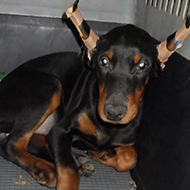
The charity has seen an 86 per cent increase over 2021.
The RSPCA has recorded an 86 per cent increase in reports of ear cropping in dogs in England and Wales over the last year.
In 2021, the animal welfare charity received 188 reports of the illegal practice, which is an considerable increase of 1,243 per cent since 2015.
In a news release, the RSPCA said: “We’ve seen a significant year-on-year rise since we started recording these figures in 2015, with a total of 467 reports to our emergency hotline in total. From 2015 to 2021, the number of reports of ear cropping rose an ‘alarming’ 1,243 per cent.
“This may partly be down to increased campaigning and awareness of the issue, but there are fears it could have been driven by celebrity culture and social media.”
Dr Samantha Gaines, head of companion animals at the charity, commented on the procedure: “Ear cropping has been illegal in the UK for a long time; and for good reason. It’s a barbaric, painful procedure that is carried out purely to achieve a desired look and to make a dog appear tougher.
“However, removing a dog’s ears can have serious, lifelong implications for that dog. Dogs who have come into our care having had their ears brutally cut off - usually without anaesthetic or pain relief - are often nervous around people and sudden movements, may struggle to socialise with other dogs and humans, and can be head-shy.
“The number of reports being made to us show an alarming increase compared to just a few years ago and we need to stamp out this animal cruelty as soon as possible. Dogs need their ears, and we need legislation that better protects dog welfare.”
Images (C) RSPCA



 The RCVS has announced a new version of its 1CPD mobile app, with enhanced features for veterinary surgeons and veterinary nurses to record their continuing professional development.
The RCVS has announced a new version of its 1CPD mobile app, with enhanced features for veterinary surgeons and veterinary nurses to record their continuing professional development.